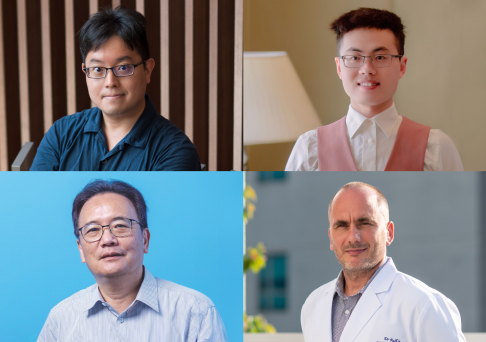Knowledge Exchange
Oct 15, 2023
Press Release: Four HKU research projects awarded US National Academy of Medicine Healthy Longevity Catalyst Award (Hong Kong) 2023
Press Release (2023-10-15):
Source: https://www.hku.hk/press/press-releases/detail/26696.html
Four HKU Research Projects Awarded US National Academy of Medicine Healthy Longevity Catalyst Award (Hong Kong) 2023

(upper row from left) Dr Rio Sugimura, Dr Leiluo Geng, (bottom row from left) Professor Victor Li, Dr Ralf Jauch
Four research projects from the Faculty of Engineering and the Li Ka Shing Faculty of Medicine at the University of Hong Kong (HKU) were awarded the Healthy Longevity Catalyst Awards (Hong Kong) in the Healthy Longevity Global Competition held by the US National Academy of Medicine.
The Healthy Longevity Global Competition is a series of awards and prizes that aim to catalyse breakthrough innovations to improve people’s physical, mental, and social health and well-being as they age. It includes three phases – the Catalyst Phase, the Accelerator Phase, and the Grand Prize Phase.
In 2022, the Research Grants Council (RGC) under the University Grants Committee of Hong Kong began collaborating with NAM to host the Healthy Longevity Catalyst Innovation Award (Hong Kong). As part of the Catalyst Phase of the Competition, the award aims to support bold, innovative ideas in any academic field that could potentially extend human healthspan, including research projects aimed at improving the health status of individuals across all age groups.
The Healthy Longevity Catalyst Awards (Hong Kong) presents ten awards each year. Each winner receives up to $50,000 USD (approximately HKD$ 389,000) in research funding for one year and becomes eligible for the Accelerator Phase and subsequent phrase of the program. Additionally, winners are invited to attend the Innovation Summit hosted by NAM, where they can share their research achievements with other awardees, policymakers, and investors. The RGC also provides a maximum allowance of 180,000 Hong Kong dollars to the winning research teams to facilitate their attendance at the Innovation Summit.
Congratulations to Dr Rio Sugimura and Dr Ralf Jauch from our school who have been awarded the US National Academy of Medicine Health Longevity Catalyst Award (Hong Kong) 2023 and their award winning projects are:
Project One
Reverse inflammaging by targeting nuclear PD-L1 in inflammatory macrophages
Principal Investigator: Dr Rio Sugimura, Assistant Professor, School of Biomedical Sciences, LKS Faculty of Medicine
About the project: Inflammaging is one of the major drivers of aging and senescence. The identification of its mechanism will enable drug discovery to stop aging. Inflammatory macrophage is the main contributor to inflammaging. Dr Sugimura's research team recently identified that nuclear PD-L1 regulates inflammatory programs in macrophages. Loss of nuclear PD-L1 inhibits the production of inflammatory cytokines of macrophages, suggesting a promising target for anti-aging therapeutics. The team proposes to determine the molecular mechanisms of nuclear PD-L1 and discover a therapeutic approach to inhibit inflammaging. The feasibility of the project is demonstrated by preliminary data and accumulated literature. The success of the project will lead to drug discovery and R&D application in the industry of Hong Kong. The impact of targeting inflammaging for human health is immense.
Project Two
Enabling the effective and safe epigenetic rejuvenation with re-engineered transcription factors
Principal Investigator: Dr Ralf Jauch, Associate Professor, School of Biomedical Sciences, LKS Faculty of Medicine
About the project: The Yamanaka factors Oct4, Sox2, Klf4 and c-Myc can convert somatic tissues into induced pluripotent stem cells resembling the inner cell mass of pre-implantation embryos. Induction of pluripotency is accompanied by a remarkable rejuvenation of cells from aged donors so that they epigenetically, structurally and metabolically resemble newborn tissue. The time restricted expression of all or some of these factors can repair damaged tissues in mice. However, the prolonged expression of Yamanaka factor induces tumors preventing the application of this strategy for human gene therapy. Dr Jauch's research team has identified several re-engineered transcription factors (eTFs) that enhance pluripotency and direct lineage reprogramming. They hypothesize that replacing the Yamanaka factors with eTFs can decouple epigenetic rejuvenation from pluripotency induction, speeds up age reversal, enhances safety and relieves cargo restrictions for gene delivery. The reseachers have previously identified re-engineered SOX17 (eSOX17), a miniaturized SOX (miniSOX) as well as enhanced POU and KLF factors (ePOU and eKLF) with established activity to convert mouse and human cells into pluripotent or multipotent stem cells. They will overexpress combinations of these eTFs in aged human fibroblasts and measure the epigenetic and cellular rejuvenation. The study aims to identify factor combinations that lose the full potential to induce pluripotency but retain the ability to rejuvenate cells akin the full complement of Yamanaka factors. The unique eTF centered approach could lead to the identification of a strategy that not only makes rejuvenation more efficacious and delivery easier but also eliminates the imminent risk of oncogenesis associated with classical Yamanaka factors.

